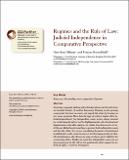| dc.description.abstract |
Reseña:According to popular wisdom, judicial independence and the rule of laware essential features of modern democracy. Drawing on the growingcomparative literature on courts, we unpack this claim by focusing ontwo broad questions: How does the type of political regime affect judicialindependence? Are independent courts, in fact, always essentialfor establishing the rule of law? In highlighting the role of institutionalfragmentation and public opinion, we explain why democracies are indeedmore likely than dictatorships to produce both independent courtsand the rule of law. Yet, by also considering the puzzle of institutionalinstability that marks courts in much of the developing world, we identifyseveral reasons why democracy may not always prove sufficient forconstructing either. Finally, we argue that independent courts are notalways necessary for the rule of law, particularly where support for individualrights is relatively widespread.According to popular wisdom, judicial independence and the rule of laware essential features of modern democracy. Drawing on the growingcomparative literature on courts, we unpack this claim by focusing ontwo broad questions: How does the type of political regime affect judicialindependence? Are independent courts, in fact, always essentialfor establishing the rule of law? In highlighting the role of institutionalfragmentation and public opinion, we explain why democracies are indeedmore likely than dictatorships to produce both independent courtsand the rule of law. Yet, by also considering the puzzle of institutionalinstability that marks courts in much of the developing world, we identifyseveral reasons why democracy may not always prove sufficient forconstructing either. Finally, we argue that independent courts are notalways necessary for the rule of law, particularly where support for individualrights is relatively widespread. |

